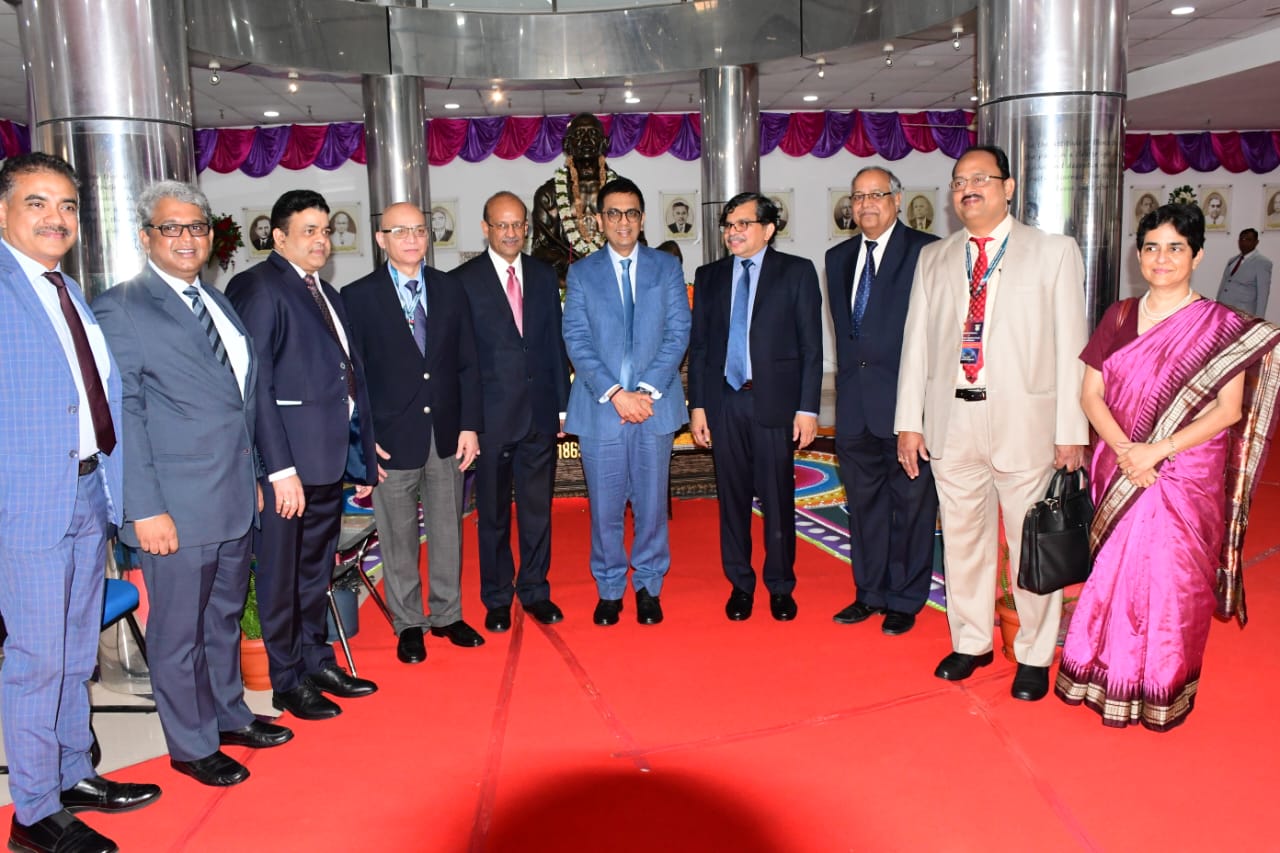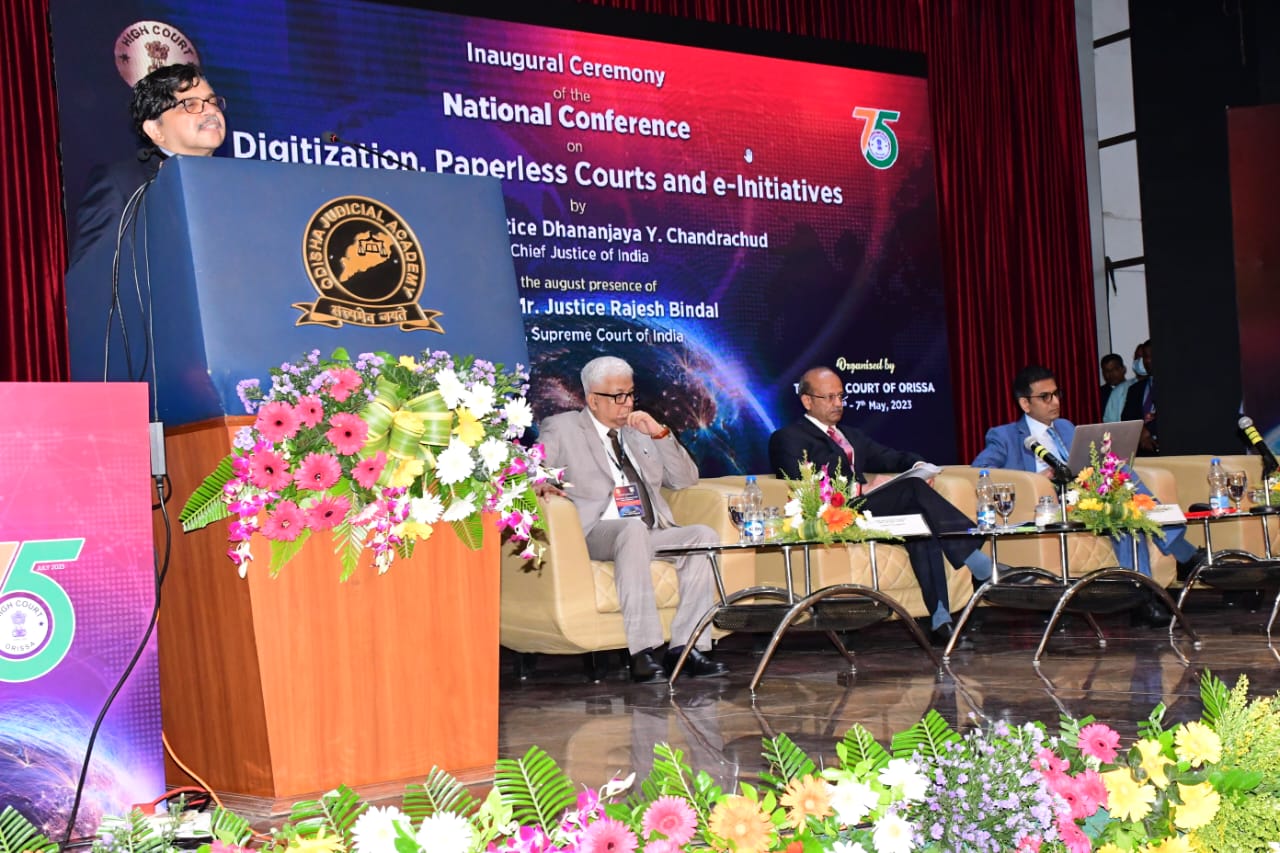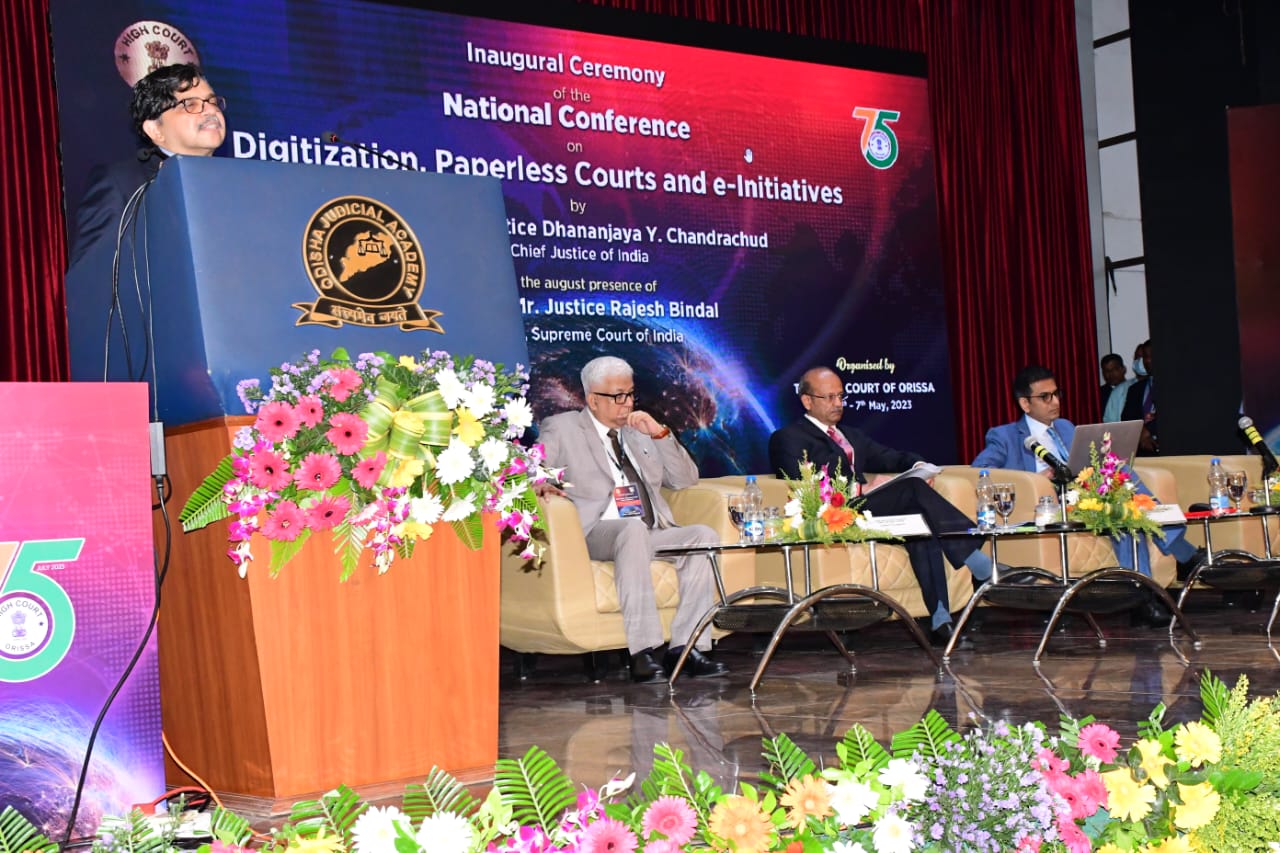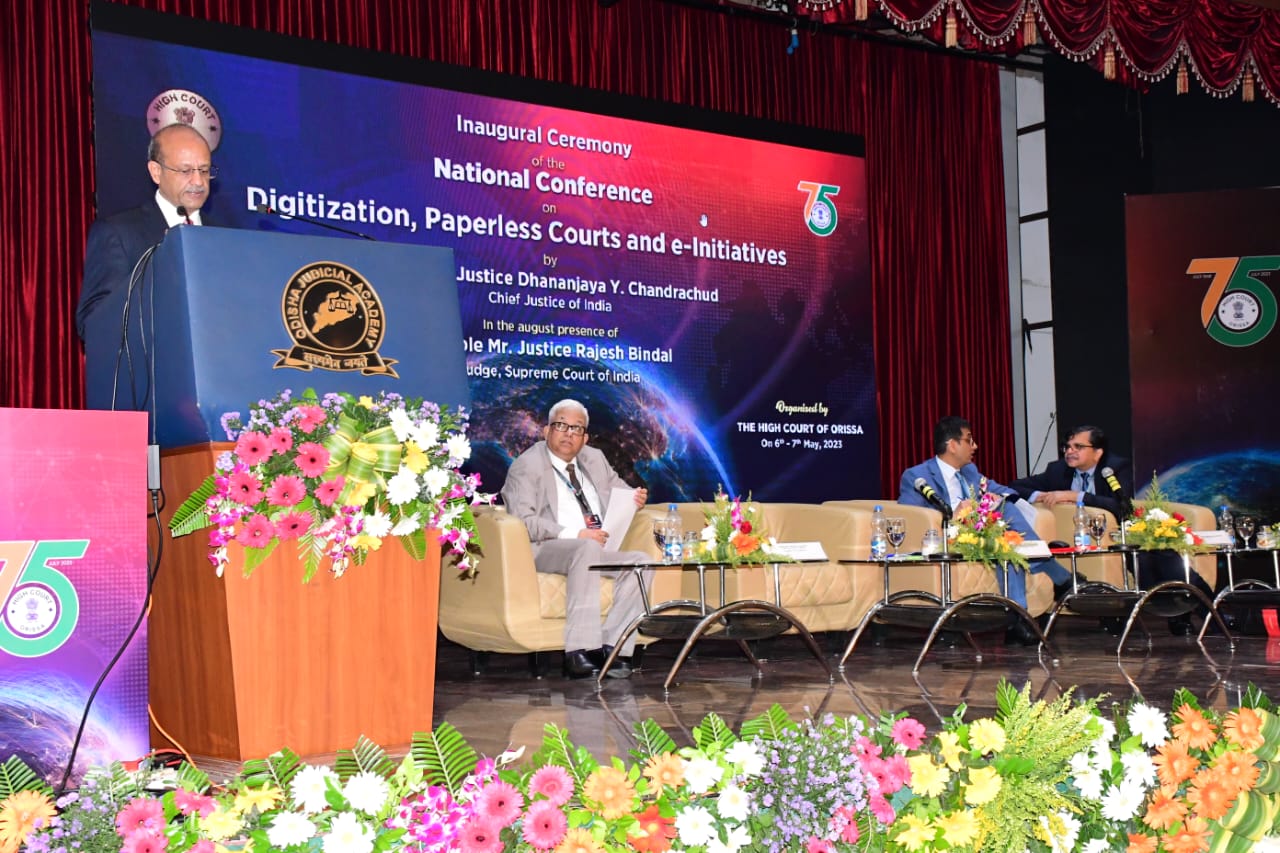Orissa High Court Organizes Two-Day National Conference on Digitization, Paperless Courts and e-Initiatives
Cuttack: To explore the possible ways of use of technology in the legal system a two days National Conference on Digitization, Paperless Courts and e-Initiatives has been organized by the High Court of Orissa in the Odisha Judicial Academy, Cuttack on 6th and 7th May, 2023.
Implementation of the Action Plan of Phase-III of e-Courts Project of the Supreme Court of India is the focal point of the Conference.
All the High Courts of the Country are participating in the Conference through their Judges and Judicial Officers. Besides, the delegates from the Department of Justice, Government of India and the e-Committee, Supreme Court of India are also attending the Conference.
The Conference was inaugurated on 6th May, 2023 by Dr. Justice Dhananjaya Y. Chandrachud, Chief Justice of India in the presence of Justice Rajesh Bindal, Judge, Supreme Court of India, Dr. Justice S. Muralidhar, Chief Justice, High Court of Orissa, Justice Bipin Sanghi, Chief Justice, High Court of Uttarakhand, Justice Tarlok Singh Chauhan, Acting Chief Justice, High Court of Himachal Pradesh, the Judges of the High Court of Orissa and all other High Courts as well as the Judicial Officers representing all the States.
The “Neutral Citation for the Indian Judiciary” was inaugurated on the occasion by the Chief Justice of India. Neutral Citation System is an initiative of Dr. Justice D.Y. Chandrachud, aimed at evolving a mechanism for standardizing case law citations. Case law reporting is an integral part of the legal system and the lawyers and Judges rely on the law reports and legal websites to access case laws. Different law reports adopt different patterns to identify a case law which often leads to confusion. Neutral Citation System is a uniform and secure methodology for identifying and citing decisions of the orders and judgments of the Supreme Court and High Courts. In this system each decision (reportable and non-reportable) of the Supreme Court and High Courts would have a citation of its own approved by the respective Court, independent of the Law Reports. The system will make it easier for Courts to publish the orders and judgments in public domain by providing a consistent method of citing judicial decisions which will facilitate easy identification, referencing and retrieval thereof. Case laws, which were so far accessible only to the subscription holders of private law-reporters, would now be available to everyone free of cost through Neutral Citations.
Delivering the welcome address in the inaugural function Dr. Justice S. Muralidhar, Chief Justice, High Court of Orissa said the Conference is primarily aimed at discussing on how to implement the National Action Plan of Phase-III of e-Courts Project. He said the ICT Initiatives like virtual hearing, live streaming, e-Filing, Paperless Courts, digitization of case records etc. which gave fillip to the legal system after the Covid pandemic are no longer new and it’s time to effect completely transformation of judiciary. Thanking the Union Government for the financial support for Phase-III of the e-Courts Project Dr. Muralidhar stressed upon the need ofdiscussing the road map for completion of the task. Expressing concern over the misuse of ICT tools he flagged the issue of data integrity and security and emphasized on framing of a Comprehensive Judicial Data Security Policy for protecting the confidential details of the citizens. He also stressed upon the need for the judiciary to build its own resources in the field of ICT instead of depending on the private agencies. Dr. Muralidhar said that training of Judicial Officers, Court staff, lawyers and their clerks on ICT Initiatives for real transformation.
Justice Rajesh Bindal, Judge, Supreme Court of India expressed concern that all the High Courts are not at same level in implementing the e-Courts Project and the ICT Initiatives which is creating an imbalance in the Pan India scenario. Justice Bindal said that non-utilization of the funds provided by the Government is a major hindrance in implementation of the Action Plan under e-Courts Project. Lauding the efforts of Dr. S. Muralidhar, Justice Bindal said that RRDC and Museum of Justice are the examples of how an effective leadership can change the scenario. He said while there are innumerable advantages of Artificial Intelligence and ICT, the growing misuse of the same is worrisome. Justice Bindal also harped on the need of training of the Judicial Officers, Court staff, lawyers and their clerks as well as the awareness of litigants and also emphasized on the use of e-Seva Kendras and Process Re-Engineering.
Delivering the inaugural address Dr. Justice D.Y. Chandrachud, Chief Justice of India referred to the Record Room Digitization Centre and lauded the leadership of Chief Justice Dr. S. Muralidhar, in making the High Court of Orissa to be at the forefront of efforts to digitize and modernize the judiciary. Dr. Justice Chandrachud discussed on the vision of Phase III of the e-Courts Project and the work that needs to be done for building a modern judiciary. He said the vision of e-Courts Project has been to ensure the principles of affordability, accessibility, cost effectiveness, environmental sustainability and transparency.
The Chief Justice of India informed that there has been budgetary outlay of Rs.7210 crores in Phase-III to be spent over a 4-year period i.e. from 2023 to 2027 which is considerably higher than that of Phase-I and II. He urged all the High Courts to optimally utilize the funds and successfully build the infrastructure for Phase III. He emphasized on creating a robust digital infrastructure as well as appropriate physical infrastructure across all courts in India including the District Courts. Expressing concern over lack of usable facilities for women litigants and lawyers as well as for persons with disabilities in the District and Taluk Courts he urged the High Courts to take immediate action to provide adequate facilities across all courts.
Dr. Justice Chandrachud said that the judiciary would be moving to cloud storage for storing digitized court records, live streaming recordings, electronic evidence and establishing paperless courts which will ensure standardization of data security and privacy norms. He said that buildingtrustworthy digital repositories is one of the primary focus areas of Phase III and this will involve digitization of the entire court records, both legacy records and pending cases. In Phase III, he said, it is proposed to digitize 3108 crore pages because this is necessary in light of the physical storage constraints that are being faced across the country. He also emphasized on simultaneous shifting to e-filing along with digitization and ensuring that further physical output is not created which is not already digitized, and for this, a mechanism to preserve born-digital data has to be built that will be received through e-filing and through ICJS which will have FIRs and charge sheets. He said Digitization shall be crucial for preservation as well as for enabling paperless courts.
The Chief Justice of India urged the High Courts not to shut down the virtual or hybrid hearing facilities with the resumption of physical courts and said that the services of infrastructure already built with public money should not be kept away from the public. He also urged to reach out to citizens to spread awareness about all the services available under the e-courts services. Speaking on the road map of Phase-III of the e-Courts Project Dr. Justice Chandrachud emphasized on the role of e-Sewa Kendras and said that there should be continuous efforts to bridge the digital divide.
Extending vote of thanks Justice S. Talapatra, Judge, High Court of Orissa and Chairman of the IT & AI Committee thanked the Chief Justice of India to conceive this National Conference at the right time when the judiciary is in the anvil of the commencement of Phase-III of the e-Courts Project which aims at building a futuristic judiciary.
The first session of the Conference was presided over by Dr. Justice D.Y. Chandrachud where presentations were made by e-Committee, Supreme Court of India and the Department of Justice, Government of India on phase-III of the e-Courts Project. In the following two sessions presided over by Justice Rajesh Bindal, the Judges of the High Courts of Calcutta, Kerala, Andhra Pradesh, Allahabad, Punjab & Haryana, Bombay, Chhatisgarh, Gauhati, Gujarat, Jammu & Kashmir and Ladakh, Jharkhand presented on how their High Courts have made use of technology in legal system and shared their experiences and challenges.
On the second day of the Conference Justice A.S. Bopanna and Justice Krishna Murari, Judges, Supreme Court of India will chair different sessions where the High Courts of Karnataka, Madras, Manipur, Patna, Rajasthan, Telengana, Tripura, Uttrakhand, Himachal Pradesh, Orissa, Kerala, Madhya Pradesh and Delhi will made presentation on how technology has been used by their High Courts and their experiences and challenges. The High Courts of Orissa, Kerala, Madhya Pradesh and Delhi will also be presenting their view points on the road map for the future. Dr. Dinesh Katre, Senior Director & HOD, Scientist-G, Co-Mission, Director-Digital Preservation C-DAC and Vivek Raghaban, Chief AI Evangelist, Bangalore will also deliberate on the second and concluding day of the Conference.
Record Room Digitization Centre of the High Court of Orissa, which has been termed by the Chief Justice of India as a role model for the other High Courts in the field of digitization, was a talking point during the Conference. The Conference has been organized by the High Court of Orissa on the request made by the Chief Justice of India in the Chief Justices’ Conference held recently in the Supreme Court.
It was an occasion for the Judges of all the High Courts of the Country attending the Conference, to visit and study the process undertaken in Record Room Digitization Centre. The visiting Judges and Judicial Officers from across the Country were also fascinated to see how the centuries old judicial documents are being preserved in the Centre for Judicial Archives and those are being showcased in the Museum of Justice.






Comments are closed.